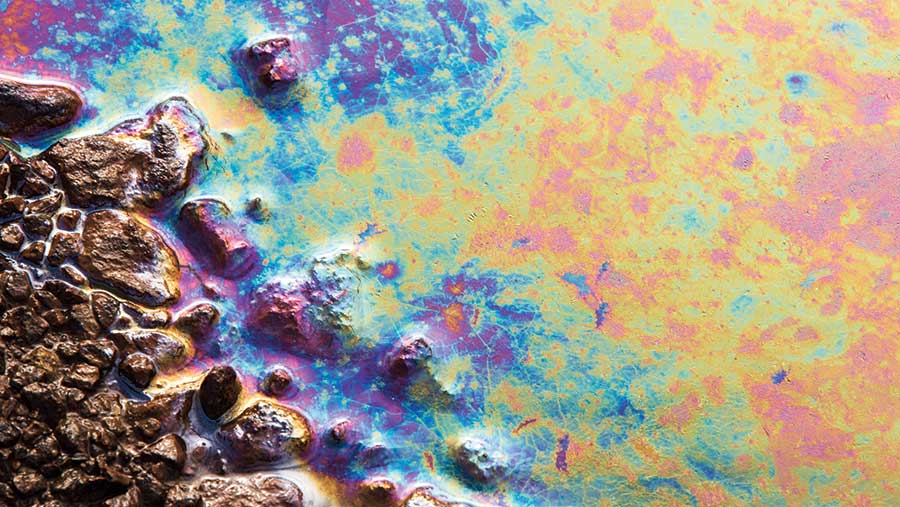How farmers can cut pollution risk and check insurance cover
 © Rex Shutterstock
© Rex Shutterstock Farm pollution incidents can be messy, time-consuming and costly, not to mention damaging to the environment and to neighbourly relations.
Clean-up costs relating to farm pollution can run to hundreds of thousands of pounds and the losses and costs covered by insurance are not always well understood, says Peter Thompson, divisional director of Agrical Chartered Loss Adjusters.
Relatively recent changes in the law have placed onerous responsibilities on farmers and landowners, especially in respect of clean-up costs under the “polluter pays” principle.
See also: Farmer fined nearly £9,000 for slurry pollution
“A legal liability can attach even if the landowner or farmer is not actually at fault. This makes it important to manage businesses in such a way that the risk of an incident that could result in a pollution event is minimised.”
Common or typical causes of accidental pollution on farms include the escape of slurry, silage effluent, diesel fuel and liquid fertiliser. While less common, milk spills are highly polluting and, litre for litre, can be worse than an oil escape if fish are at risk.
Common situations that result in claims include:
- Escape of slurry following the failure of a slurry store’s bund wall
- Silage effluent leaching and running via land drains into ditches and watercourses
- Spillages of fuel and/or oil, often following accidents that rupture tanks, or theft incidents where hoses are cut or valves are left open by thieves
- Escapes of liquid fertiliser from tanks. Tanks are sometimes mistaken for fuel tanks by thieves and escapes happen when valves are left open. They can also be ruptured when hit by tractors, trailers and mounted implements
- Escapes of pesticides following accidents involving crop sprayers
“All these potential pollutants spread easily via drains into watercourses and cause substantial damage to the environment,” says Mr Thompson.
Normally, farm insurance covers the business of farming, so it’s important to inform insurers about any change in activity such as storing fertiliser for a merchant, or allowing others to conduct activities on land or in your buildings.
Until relatively recently, most insurance policies excluded cover for liabilities attaching to a farmer as the result of pollution or contamination, says Mr Thompson.
“Most policies now provide limited cover for clean-up costs associated with a sudden, accidental and unforeseeable event. However, these policies do not all provide comprehensive protection as standard.”
Pollution practicalities
- If an incident could result in pollution, a farmer or landowner should immediately notify the Environment Agency
- Make sure staff know what to do, including informing the authorities if the manager/owner of the business is not available. Train staff to make them aware of risks
- Mitigate the problem as far as is practical and within your powers. Measures often include temporarily damming watercourses to contain pollutants, using an absorbent material to mop up a spillage and pumping polluted water out of a ditch with a vacuum tanker for safe disposal later
- Bunded fuel tanks are a legal requirement, helping prevent fuel spillages that used to occur when older steel tanks simply rusted through. However, these units still need to be well-managed and kept secure to minimise the risk of an accidental escape of fuel
- Ensure silage clamps and slurry stores are well maintained and that catch pits to collect run-off are checked and emptied as required
- Placing liquid fertiliser tanks within an adequate bund structure is not a legal requirement but would be good practice
- Know where drains and ditches run to, even where they run through neighbours’ land and have a plan for blocking them in the event that this is necessary to contain pollution
Specialist environmental impairment liability policies are now available, either as a stand-alone product, or as an optional extension to a farm or estate combined policy.
“These provide significantly broader cover, which can extend to liabilities that arise following a gradual seepage of pollutants, more help with the cost of rectification of damage to the policyholder’s own land, the cost of habitat and species restoration and, in some circumstances, legal fees associated with arranging legal support for policyholders who are prosecuted in relation to environmental offences,” says Mr Thompson.
While damage to third-party property is usually covered under the farm’s public liability policy, fines imposed following pollution incidents are not covered by insurance.
What does a loss adjuster do?
- Establishes the cause of a loss and whether it is covered by the insurance policy
- Advises on action to reduce further loss, including recommending repairs
- Reports to the insurer on the validity of the claim, value of the claim and makes payment recommendation
- Usually work for a wide range of insurers
- Paid by the insurer but should be impartial
